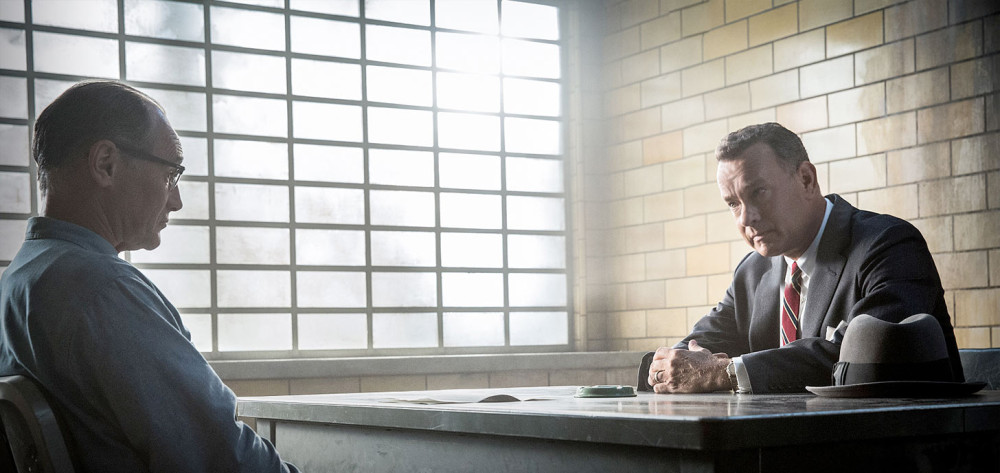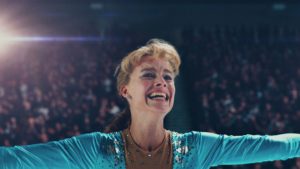
On the surface, Steven Spielberg’s Bridge of Spies looks exactly like the kind of prestige film the Academy Awards revel in rewarding. It takes place during the Cold War, rendering it able to engage with the boogeyman of the moment, Communists. One of the choice sound bytes used in the trailer refers to the U.S. Constitution as a rulebook, so the misty-eyed patriotism is taken care of. A title card early on points out that the film is based on real events, and the characters get a “where are they now?” blurb towards the and. Even the credits read like a laundry list of achingly tasteful performers and technicians: Spielberg, Tom Hanks, composer Thomas Newman, cinematographer Janusz Kaminski. Ultimately, though, Bridge of Spies exposes a similar truth about so-called “adult” filmmaking that Spotlight did: that care, craft, and competence are underrated virtues, and what distinguishes the torpidity of real Oscar bait from the placidity of great drama is raw skill.
Hanks stars as James B. Donovan, an insurance lawyer in late-50s Brooklyn who is asked to defend Rudolf Abel (Mark Rylance, excellent), a man accused of being a Soviet spy. The first chunk of the film is chiefly concerned with depicting both Hanks and Rylance as two men doing their assigned jobs to the best of their abilities; the latter is stoic to a fault, rolling with the punches as only a true professional could, while the former’s iron-clad lawful-good quest for due process makes everyone around him either confused or livid. There’s also a parallel story involving young Army recruits and hyper-secretive spy plane technology (i.e., the part of the film where Spielberg gets dorky about plane specs) that strengthens the film’s throughline about competence being an ace-in-the-hole. As the film goes on, this throughline bleeds outward into the metatext: the creators of the film have a skillset that is way too easy to take for granted.
Steven Spielberg is a classicist, directing in a old-school show-and-tell style. Accusations of his camera work being too hand-holdy ring true occasionally, but quickly dissipate as Bridge of Spies goes on. Here is a man who has been doing this for 45 years now, his instincts sharpened and polished over time like a slab of obsidian. Few directors are as intuitive in their filmmaking, with every position and cut feeling second-nature. This resulting patience makes for an unnervingly restrained movie, almost disconcerting free of bombast and incident. Not to say that this movie doesn’t hit classic spy-novel beats: the mostly-wordless opening chase/raid sequence is a crackerjack thriller set piece, while every scene involving Hanks playing verbal chess against a CIA operative or an East German official is equal parts terse and knotty.
Hanks, like Spielberg, is an old pro with nearly five decades’ worth of experience under his belt that we somehow now take for granted. This seems like a strange thing to say about a man with a legendary career with two Oscars to his name, but consider that Hanks occupies a very specific place in the collective consciousness as an actor, that of the aw-shucks everyman, the proverbial Good Dude. Hanks is one of the few working actors who wouldn’t feel out of place in the Hollywood of yesteryear. But there is a kind of button-downed nervousness and generosity of spirit inherent in many of Hanks’ performances, Bridge of Spies included, that makes people watching remember just how good Hanks is at what he does. He plays loose without being sloppy, he monologues without sounding didactic, and emotes earnestly without mugging, a paragon of humanism in performance.
The keys to the film are in the details: Newman, coming for a literal dynasty of decorated composers, working with a director who favours big scores, delivers a series of stately pieces that accent the small, musty atmosphere of the film. Kaminski, master lensman that he is, bathes the frame in blinding white/yellow light in moments of seclusion, while color-coding the Le Carré-esque purgatory world of the spies and officials with a million different shades of gray and brown. Rylance, a stage actor-cum-bit player, excels in a role that requires him to not speak above a quiet room tone or to not emote beyond a shrug. Even the Coen brothers add sneaky comic grace notes to the film’s proceedings. Bridge of Spies of a movie that exists in negative space, where the areas the between the notes are more thunderous than the text itself. The mix of deliberateness and understatement is key, negotiating a universe that is both lived-in and artificial, acknowledged and not.
Bridge of Spies, in a strange way, is tailor-made for us to undervalue as a piece of drama and a piece of storytelling. In spite of the baggage its premise and crew carry, it’s not a pedigree movie. Sure, it’s a spy thriller, the classiest of all genre films subcategories, but it exhibits the dryness and method of the sharpest of those films, making this sort of a termite in white elephant’s clothes. It is the very definition of a major minor film, a work of art this is small-stakes in construction but exhibits spectacular craft in the margins. This is in contrast to the aforementioned Spotlight, which operates as a minor major film, a piece of moviemaking that strives to be capital-I important and files down the edges for effect. While both films are successful as brainly, tasteful films about process, negotiation, and trying to work amidst smoke and mirrors, Bridge of Spies is ultimately the more satisfying of the pair because its very construction prevents it from being showy. It’s the difference between seamless filmmaking and filmmaking that erases the seams.
—
Bridge of Spies is available on home video.
Directed by Steven Spielberg; written by Matt Charman, Ethan Coen, and Joel Coen; starring Tom Hanks, Mark Rylance, Scott Shepard, Amy Ryan, Sebastian Koch, and Alan Alda; 141 minutes.



 Derek
Derek
 Isabelle
Isabelle